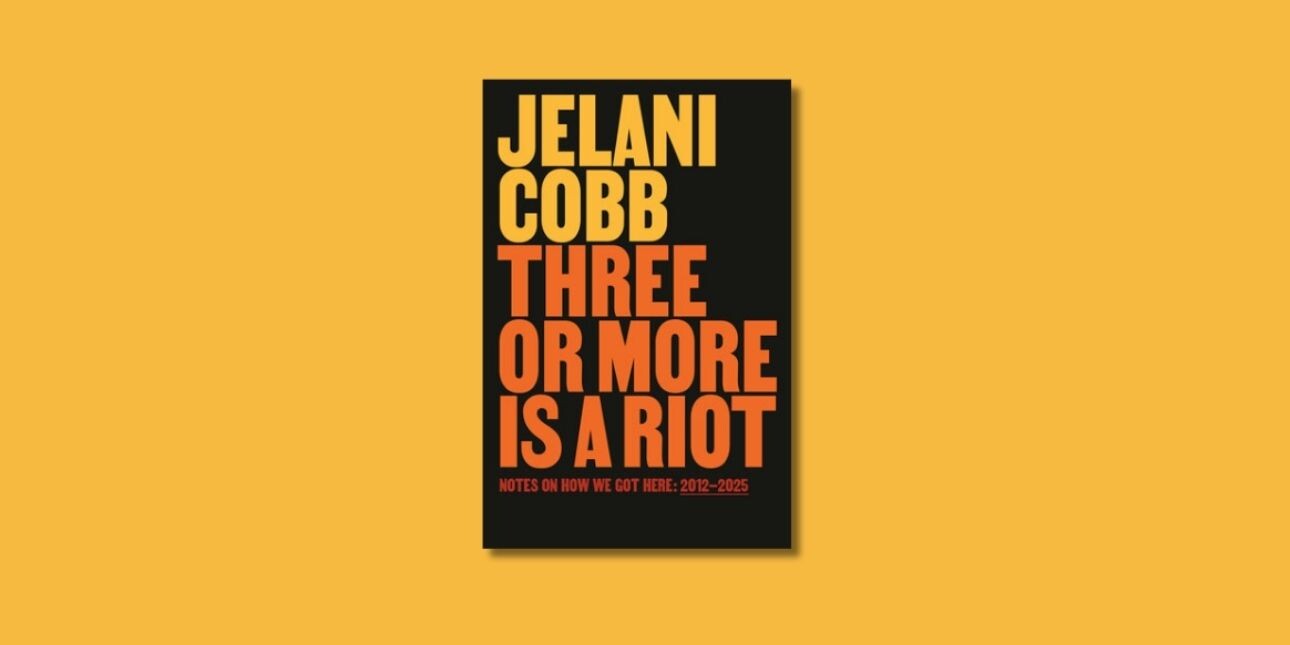Three Or More Is a Riot: Notes on How We Got Here by Jelani Cobb
A sober, kaleidoscopic collection of essays exploring how racial violence, white supremacy, and resistance are intertwined, from one of America’s foremost chroniclers of race and racial injustice.
It’s fair to say that if for the UK, class remains the deeply entrenched faultline, the seething pit successive politicians have attacked with hydraulics, for the US, it’s race: the main prism through which inequality, justice, and power have played out for centuries.
The New Yorker’s Jelani Cobb (who is also Dean of the Columbia Journalism School) has been documenting this intersection of race, history, and American social and political life for more than two decades; and in this new collection, spanning the past 13 years, he embarks on a tour of tragedies.
They span the 2012 murder of 17-year-old Trayvon Martin by a twitchy neighbourhood watch volunteer, which initiated the Black Lives Matter movement, and “ruined the mood of a nation that had, just a few years earlier, elected its first black president,” to the shock return of Donald Trump to the White House in 2025, in which millions of Americans, including an estimated 18 million Black voters, had willingly marched into the open, salivating mouth of a wolf.
The election of Barack Obama
So, how did we get here? If for the outside world, Barack Obama’s election had been an historic triumph, for many Americans, as Cobb reflects, it had been a “national humiliation”, undermining their “understanding of what the United States is, or at least what it is supposed to be.” As the Pulitzer nominee observed in November 2016, “Some element of national humiliation and decline predisposes nations toward fascism”. American white supremacy has had more comebacks than Dracula.
The book opens with the story of Amir Locke, a 22-year-old shot by Minneapolis police just 20 months after George Floyd’s murder. In a state of shock, Locke’s grieving father Andre had blindly driven around the same roundabout three times, seemingly unable to escape it – lending itself to a haunting metaphor Cobb calls “the loop.”
And it’s an image that binds these stories: that of a nation forever caught in a spin cycle of racial trauma, violence and denial. Some 4,700 racial lynchings occurred across the United States from 1882 to 1968; as former Georgia state representative Stacey Abrams told Cobb in 2019, “We’ve never not been in this situation.”
Cobb rejects the cosy lie that history “bends toward justice,” insisting it only bends “because people keep bending it.” And In Three Or More… he profiles the activists and institutions who refuse to give up, trying – often failing – to break the loop; people such as Abrams, standing against voter suppression, and civil rights lawyer Benjamin Crump, aka “Black America’s Attorney General”, whom he shadows from courtroom to courtroom, tirelessly pursuing justice for slain Black Americans, including Martin and Floyd. “I want to stop,” he tells Cobb. “But they just won’t stop killing Black people.”
Democrats and Republicans
Elsewhere, in his 2021 essay How Parties Die, he explores the transformation of both Democrats and Republicans, who have each adjusted their political identities to survive, and metastasised into that “it once reviled”. Though you wouldn’t refer to this book as ‘hopeful’ (it’s too clear-eyed and realistic for that), here we might take mixed comfort from his assertion that “the arc of political movements in this country has never been predictable.”
There are film reviews (Black Panther, Django Unchained), and other writings on pop culture, such as Hip-Hop at Fifty: An Elegy, showing how art preserves Black history and identity. And, most poignantly, a requiem for his own alma mater, Jamaica High in Queens, where his physics teacher taught him about quarks after class in the 1980s; now shuttered in 2014, after decades of systemic neglect.
This is a compulsively readable archive of a nation wrestling with itself; essays that read simultaneously like an autopsy and live dispatches from the frontlines of American racial trauma. For anyone attempting to understand the forces shaping America today, and how its history of white supremacy continues to influence events, it’s essential reading.
- Three Or More Is a Riot: Notes on How We Got Here is out now from Penguin Random House.

Ali Catterall is an award-winning writer, journalist and filmmaker whose writing has featured in the Guardian, Time Out, GQ, Film4, Word magazine and the Big Issue, among many others. Ali is also the writer and director of the 2023 film Scala!!!
Further reading
'I get called Grandma in meetings' - the PR industry must tackle its ageism problem
Can you be sued for a social media post? What PR pros need to know
How surf wear brand Finisterre maximised PR impact by subverting stereotypes

